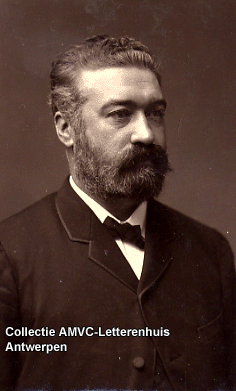
Julius De Vigne
Encyclopedia

Belgium
Belgium , officially the Kingdom of Belgium, is a federal state in Western Europe. It is a founding member of the European Union and hosts the EU's headquarters, and those of several other major international organisations such as NATO.Belgium is also a member of, or affiliated to, many...
lawyer, politician and writer. He studied law at the University of Ghent and established himself as a lawyer. For several years, he was a member of the provincial - and municipal Council of Ghent. As a student at the university, he contributed to the student almanacs, published by the Flemish
Flanders
Flanders is the community of the Flemings but also one of the institutions in Belgium, and a geographical region located in parts of present-day Belgium, France and the Netherlands. "Flanders" can also refer to the northern part of Belgium that contains Brussels, Bruges, Ghent and Antwerp...
literary student organization 't zal wel gaan
't zal wel gaan
TSG 't Zal wel gaan, is a non-profit student society founded in the 19th century to promote Flemish culture and liberalism in Flanders, based at Ghent University. Since its inception, the student fraternity was characterized by its progressive, Flemish, and libertarian nature. It supports the...
. When the Flemish weekly Het Volksbelang was founded by Julius Vuylsteke
Julius Vuylsteke
Julius Vuylsteke was a Belgian liberal politician and writer. He started his career as a lawyer, but later opened a bookshop. As a liberal Flemish politician, he founded the liberal association 't zal wel gaan, and he played an important role in the Flemish movement...
, in 1867, he was one of the editors together with Julius Sabbe
Julius Sabbe
Julius Ludovicus Maria Sabbe was a Flemish publisher and an active member of the Flemish movement...
, Jozef Van Hoorde
Jozef Van Hoorde
Jozef Van Hoorde was a Flemish writer. He first went to the local school and then to high school at the Koninklijk Athenaeum in Ghent....
, and Adolf Hoste
Adolf Hoste
Adolf Hoste was a publisher in Ghent in the 19th century. He was a publisher of Flemish avant garde, such as Anton Bergmann and Novellen of Rosalie and Virginie Loveling. When the Flemish weekly Het Volksbelang was founded by Julius Vuylsteke, in 1867, he was one of the editors together with Julius...
.
In 1883 he was the primary supporter of the third Taalwet (E: language law), which stated that at the public schools and Royal Athenaea in Flanders
Flanders
Flanders is the community of the Flemings but also one of the institutions in Belgium, and a geographical region located in parts of present-day Belgium, France and the Netherlands. "Flanders" can also refer to the northern part of Belgium that contains Brussels, Bruges, Ghent and Antwerp...
, education would be preferably in Dutch
Dutch language
Dutch is a West Germanic language and the native language of the majority of the population of the Netherlands, Belgium, and Suriname, the three member states of the Dutch Language Union. Most speakers live in the European Union, where it is a first language for about 23 million and a second...
instead of French
French language
French is a Romance language spoken as a first language in France, the Romandy region in Switzerland, Wallonia and Brussels in Belgium, Monaco, the regions of Quebec and Acadia in Canada, and by various communities elsewhere. Second-language speakers of French are distributed throughout many parts...
.

